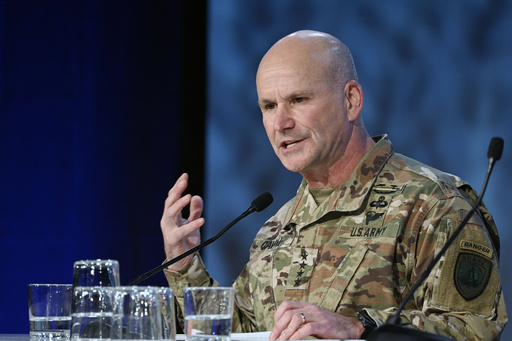In Washington, a bipartisan wave of criticism emerged from members of the House Armed Services Committee concerning the Trump administration’s reported contemplation of reducing U.S. forces in Europe. Lawmakers emphasized that the United States must uphold its commitments to NATO allies.
Rep. Michael Rogers, a Republican from Michigan and the chairman of the panel, was adamant that the U.S. should not lower troop numbers in Europe. He expressed his opposition to any plans that could lead to the U.S. relinquishing leadership within NATO. Traditionally, the U.S. has held the position of Supreme Allied Command Europe, also known as SACEUR.
“Leadership by the U.S. in NATO is critical to ensure that American forces, including nuclear armaments, stay under our command,” Rogers asserted during a hearing with Army General Christopher G. Cavoli, the commander of U.S. European Command and NATO.
Rep. Michael Turner of Ohio sharply criticized even discussing the possibility of giving up the SACEUR role, labeling such debate as incomprehensible.
Katherine Thompson, serving as assistant defense secretary for international affairs, emphasized to lawmakers that the Pentagon is conducting an ongoing review of troop levels and that no final decisions had been reached. However, when pressed about the possibility of the U.S. relinquishing the SACEUR position, she definitively stated, “No.” This marked the first explicit denial from Pentagon officials regarding the U.S. giving up the post, a role that Cavoli affirmed strengthens American leadership within NATO.
In recent years, the number of U.S. troops in Europe has hovered around 100,000, which includes a 20,000 troop increase since Russia’s invasion of Ukraine in February 2022.
Cavoli informed the committee that he has recommended maintaining the current number of troops. He explained that any reduction in American forces would delay the U.S. military’s response to crises in Europe. “Relocating forces across the Atlantic adds complexity and delays,” he noted, adding that the current forces, alongside allied contributions, are effectively deterring Russian aggression.
Upon questioning by Rep. Don Bacon of Illinois about the possibility of the Trump administration pulling two rotational brigades from Europe, Cavoli explained that troop level reviews are ongoing, addressing readiness and modernization concerns. Bacon emphasized that any troop reduction would project American vulnerability.
Rep. Adam Smith, a Democrat from Washington and the committee’s ranking member, advocated for sustained U.S. support to Europe and Ukraine. He further criticized President Donald Trump for allegedly empowering Russia’s President Vladimir Putin. Trump has swung towards ending Russia’s conflict with Ukraine and scaled back support for Ukraine upon returning to office, emphasizing that Europe should shoulder its defense responsibilities.
Cavoli pointed out that NATO allies are significantly investing in defense, marking the most substantial rate since the Cold War, noting a 40% increase since the Ukraine conflict began.
Thompson faced reprimands from Smith and others for inaccurately suggesting a ceasefire in Ukraine. “There is no ceasefire,” Smith clarified, emphasizing continued Russian bombings.
Thompson struggled under questioning about Trump’s overt statements regarding Putin and his suggestion that Ukraine initiated the conflict, describing Trump’s objective as seeking a ceasefire.
Rep. Salud Carbajal, a Democrat from California, criticized Thompson, accusing her of offering uninformative and pre-scripted responses.
Thompson conveyed that the U.S. is candid with NATO allies about the need for increased defense investment, characterizing some European nations as relying too heavily on the U.S. for defense. She refrained from discussing specifics surrounding a planned military operation against Yemen’s Houthi rebels, citing adherence to security protocols.


